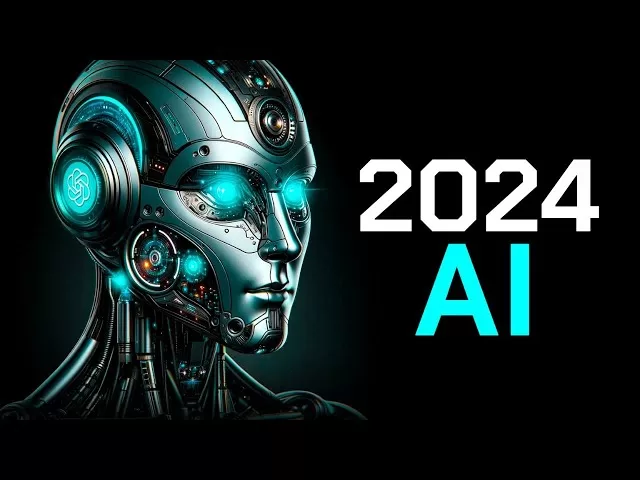Congratulations on Surviving 2023: A Look Ahead to 2024
The Job Market Landscape
Congratulations on making it through 2023 in the tech world, where layoffs were rampant, and job security seemed like a distant dream. The job market took a hit with massive layoffs from tech giants like Amazon, Google, and Microsoft, flooding the industry with talent while simultaneously reducing the number of open positions by 60%. This made it tough for junior developers to break into the industry. The shift to remote work in 2021 allowed people to juggle multiple full-time jobs, but now managers are eager to bring employees back to the office, making the job market more competitive than ever.
Despite the challenges, there is a glimmer of hope on the horizon. Job openings have seen a 13.8% increase from earlier this year, and major tech companies have lifted their hiring freezes. While the job market is showing signs of improvement, the overall state of the world and high-interest rates remain factors that could impact the future of tech jobs in 2024.
The Rise and Fall of Crypto
The world of cryptocurrency has seen its fair share of ups and downs, with Bitcoin’s price surging from $16k to over $40k in a matter of months. Cryptocurrency enthusiasts are predicting that the value of certain tokens could skyrocket to over a million dollars by the end of 2024. Keep an eye out for the magic number of $69k, as it could usher in a new era of crypto hype and investment opportunities.
With the potential end of the crypto winter, we may see a resurgence of Ponzi schemes and speculative investments in the space. It’s a rollercoaster ride that keeps investors on their toes, but for those willing to take the risk, the rewards could be substantial.
The Future of Augmented and Virtual Reality
Augmented and virtual reality have been on the horizon for years, with the upcoming release of the Apple Vision Pro in early 2024 poised to shake up the industry. Apple’s foray into VR technology could open up new avenues for app developers and tech enthusiasts. However, the hefty price tag of $3,500 may deter the average consumer from diving into the world of VR headsets.
While some see VR as the next big thing, others believe it will remain a niche product, catering to a specific audience rather than the masses. The future of AR and VR technology remains uncertain, but one thing is clear – innovation in this space is accelerating at a rapid pace.
The Shift to Arm-Based Chips
Microsoft’s recent announcement of producing its own chips, such as the Maya chip for AI and the Cobalt CPU for cloud computing, signals a major shift in the hardware landscape. With AWS also developing Arm-based chips for improved efficiency and cost-effectiveness, the dominance of x86 architecture in PCs and laptops may be challenged in the coming years.
Project Volta’s initiative to run Windows on Arm chips and Intel’s plans to manufacture Arm chips hint at a future where hardware innovation is key. As technology evolves, the role of CPUs in gaming and computational tasks will continue to shape the industry landscape.
The Unpredictable World of Game Development
The gaming industry is no stranger to hype and anticipation, with the recent unveiling of the GTA 6 trailer generating buzz among gamers. Rockstar’s proprietary game engine promises an immersive gaming experience that fans are eager to dive into. While Unity faced backlash for its pricing structure in 2023, Unreal Engine’s latest release offers innovative features that push the boundaries of game development.
Epic Games’ ongoing legal battle with Apple over App Store fees could have far-reaching implications for indie developers seeking alternative payment methods. The gaming industry continues to evolve, with new technologies and platforms reshaping the way we play and interact with virtual worlds.
The Evolution of Web Development
Web development is a dynamic field that constantly adapts to new trends and technologies. In 2024, the focus may shift from building new JavaScript frameworks to enhancing existing ones with innovative tools and features. Visual editors and IDEs for frameworks like React are making it easier for developers to create dynamic web applications without the need for extensive coding.
AI-powered tools like Visual Co-Pilot are revolutionizing code generation, paving the way for more efficient and accurate development workflows. The future of web development lies in harnessing the power of AI to streamline coding processes and enhance user experiences.
The Mobile App Dilemma
Mobile app development has seen a shift in recent years, with a decline in user interest in downloading new apps. Established platforms like Twitter and Discord dominate screen time, making it challenging for new apps to gain traction. Cross-platform development tools are emerging to simplify app creation for both iOS and Android, offering developers a more efficient way to reach a wider audience.
The mobile app landscape is competitive, with developers facing the challenge of standing out in a crowded market. As user preferences and behaviors evolve, mobile app developers must adapt to changing trends and consumer demands to stay relevant in a fast-paced digital world.
The Rise of Low-Level Systems Languages
Low-level systems languages like Rust are gaining popularity for their performance and versatility. Rust’s integration into the Linux kernel highlights its growing significance in the tech industry. Emerging languages like Zig and Mojo offer alternative options for developers seeking efficient and manageable solutions for AI and machine learning applications.
As technology advances, the demand for low-level systems programming languages is expected to rise, providing developers with the tools they need to build robust and scalable applications. The future of tech lies in harnessing the power of low-level languages to drive innovation and create cutting-edge solutions for complex problems.
The Era of Artificial Intelligence
Artificial intelligence is reshaping industries and transforming the way we work and interact with technology. AI models like GPT and Bard are revolutionizing content creation and data analysis, leading to a surge in automated processes and decision-making. The integration of AI into everyday tools and applications is paving the way for a more efficient and intelligent future.
As AI continues to evolve, the possibilities are endless, from text-to-video generation to advanced image processing. The quest for artificial general intelligence (AGI) remains a tantalizing goal, with the potential to revolutionize society and redefine the boundaries of human achievement. The future of AI is bright, offering a world of endless possibilities and groundbreaking discoveries.
In Conclusion
As we look ahead to 2024, the tech landscape is filled with opportunities and challenges. From the changing job market to the evolution of AI and VR technology, the future is ripe with innovation and growth. Embracing new trends and technologies will be key to staying ahead in a competitive and dynamic industry.
Whether you’re a developer, gamer, or tech enthusiast, the coming year promises to be an exciting journey filled with new possibilities and discoveries. So buckle up, stay informed, and get ready to embrace the future of tech in 2024. Congratulations on surviving 2023, and here’s to a bright and prosperous year ahead!
Made with VideoToBlog
The Job Market Landscape
Congratulations on making it through 2023 in the tech world, where layoffs were rampant, and job security seemed like a distant dream. The job market took a hit with massive layoffs from tech giants like Amazon, Google, and Microsoft, flooding the industry with talent while simultaneously reducing the number of open positions by 60%. This made it tough for junior developers to break into the industry. The shift to remote work in 2021 allowed people to juggle multiple full-time jobs, but now managers are eager to bring employees back to the office, making the job market more competitive than ever.
Despite the challenges, there is a glimmer of hope on the horizon. Job openings have seen a 13.8% increase from earlier this year, and major tech companies have lifted their hiring freezes. While the job market is showing signs of improvement, the overall state of the world and high-interest rates remain factors that could impact the future of tech jobs in 2024.
The Rise and Fall of Crypto
The world of cryptocurrency has seen its fair share of ups and downs, with Bitcoin’s price surging from $16k to over $40k in a matter of months. Cryptocurrency enthusiasts are predicting that the value of certain tokens could skyrocket to over a million dollars by the end of 2024. Keep an eye out for the magic number of $69k, as it could usher in a new era of crypto hype and investment opportunities.
With the potential end of the crypto winter, we may see a resurgence of Ponzi schemes and speculative investments in the space. It’s a rollercoaster ride that keeps investors on their toes, but for those willing to take the risk, the rewards could be substantial.
The Future of Augmented and Virtual Reality
Augmented and virtual reality have been on the horizon for years, with the upcoming release of the Apple Vision Pro in early 2024 poised to shake up the industry. Apple’s foray into VR technology could open up new avenues for app developers and tech enthusiasts. However, the hefty price tag of $3,500 may deter the average consumer from diving into the world of VR headsets.
While some see VR as the next big thing, others believe it will remain a niche product, catering to a specific audience rather than the masses. The future of AR and VR technology remains uncertain, but one thing is clear – innovation in this space is accelerating at a rapid pace.
The Shift to Arm-Based Chips
Microsoft’s recent announcement of producing its own chips, such as the Maya chip for AI and the Cobalt CPU for cloud computing, signals a major shift in the hardware landscape. With AWS also developing Arm-based chips for improved efficiency and cost-effectiveness, the dominance of x86 architecture in PCs and laptops may be challenged in the coming years.
Project Volta’s initiative to run Windows on Arm chips and Intel’s plans to manufacture Arm chips hint at a future where hardware innovation is key. As technology evolves, the role of CPUs in gaming and computational tasks will continue to shape the industry landscape.
The Unpredictable World of Game Development
The gaming industry is no stranger to hype and anticipation, with the recent unveiling of the GTA 6 trailer generating buzz among gamers. Rockstar’s proprietary game engine promises an immersive gaming experience that fans are eager to dive into. While Unity faced backlash for its pricing structure in 2023, Unreal Engine’s latest release offers innovative features that push the boundaries of game development.
Epic Games’ ongoing legal battle with Apple over App Store fees could have far-reaching implications for indie developers seeking alternative payment methods. The gaming industry continues to evolve, with new technologies and platforms reshaping the way we play and interact with virtual worlds.
The Evolution of Web Development
Web development is a dynamic field that constantly adapts to new trends and technologies. In 2024, the focus may shift from building new JavaScript frameworks to enhancing existing ones with innovative tools and features. Visual editors and IDEs for frameworks like React are making it easier for developers to create dynamic web applications without the need for extensive coding.
AI-powered tools like Visual Co-Pilot are revolutionizing code generation, paving the way for more efficient and accurate development workflows. The future of web development lies in harnessing the power of AI to streamline coding processes and enhance user experiences.
The Mobile App Dilemma
Mobile app development has seen a shift in recent years, with a decline in user interest in downloading new apps. Established platforms like Twitter and Discord dominate screen time, making it challenging for new apps to gain traction. Cross-platform development tools are emerging to simplify app creation for both iOS and Android, offering developers a more efficient way to reach a wider audience.
The mobile app landscape is competitive, with developers facing the challenge of standing out in a crowded market. As user preferences and behaviors evolve, mobile app developers must adapt to changing trends and consumer demands to stay relevant in a fast-paced digital world.
The Rise of Low-Level Systems Languages
Low-level systems languages like Rust are gaining popularity for their performance and versatility. Rust’s integration into the Linux kernel highlights its growing significance in the tech industry. Emerging languages like Zig and Mojo offer alternative options for developers seeking efficient and manageable solutions for AI and machine learning applications.
As technology advances, the demand for low-level systems programming languages is expected to rise, providing developers with the tools they need to build robust and scalable applications. The future of tech lies in harnessing the power of low-level languages to drive innovation and create cutting-edge solutions for complex problems.
The Era of Artificial Intelligence
Artificial intelligence is reshaping industries and transforming the way we work and interact with technology. AI models like GPT and Bard are revolutionizing content creation and data analysis, leading to a surge in automated processes and decision-making. The integration of AI into everyday tools and applications is paving the way for a more efficient and intelligent future.
As AI continues to evolve, the possibilities are endless, from text-to-video generation to advanced image processing. The quest for artificial general intelligence (AGI) remains a tantalizing goal, with the potential to revolutionize society and redefine the boundaries of human achievement. The future of AI is bright, offering a world of endless possibilities and groundbreaking discoveries.
In Conclusion
As we look ahead to 2024, the tech landscape is filled with opportunities and challenges. From the changing job market to the evolution of AI and VR technology, the future is ripe with innovation and growth. Embracing new trends and technologies will be key to staying ahead in a competitive and dynamic industry.
Whether you’re a developer, gamer, or tech enthusiast, the coming year promises to be an exciting journey filled with new possibilities and discoveries. So buckle up, stay informed, and get ready to embrace the future of tech in 2024. Congratulations on surviving 2023, and here’s to a bright and prosperous year ahead!
The Democratization of Artificial Intelligence
The democratization of AI continues to gain momentum, with platforms like OpenAI’s GPT providing accessible AI capabilities to developers worldwide. Startups and small businesses are leveraging AI-powered tools for tasks ranging from customer service chatbots to predictive analytics, leveling the playing field in the tech industry.
The Metaverse: A New Frontier
The concept of the metaverse has captured the imagination of tech visionaries and investors alike. Companies like Meta (formerly Facebook) are investing heavily in virtual reality and social platforms, envisioning a future where people live, work, and socialize in immersive digital worlds. The metaverse presents opportunities for innovative applications in entertainment, education, and beyond.
Sustainable Technology: Greening the Industry
With growing concerns about climate change, sustainability is becoming a top priority for the tech industry. Companies are investing in renewable energy sources, reducing carbon footprints, and designing eco-friendly products. From data centers powered by renewable energy to energy-efficient hardware, the push for sustainability is reshaping the way technology is developed and consumed.
Cybersecurity: A Never-Ending Battle
As technology advances, so do cybersecurity threats. From ransomware attacks to data breaches, cybersecurity remains a constant concern for businesses and consumers alike. Companies are investing in advanced security measures, including AI-driven threat detection and blockchain-based encryption, to safeguard sensitive data and protect against emerging threats.
Quantum Computing: Unlocking the Future
Quantum computing holds the promise of revolutionizing computation, solving complex problems that are beyond the capabilities of classical computers. While still in its early stages, advancements in quantum hardware and algorithms are paving the way for practical applications in fields like cryptography, drug discovery, and optimization.
The Gig Economy: Redefining Work
The rise of the gig economy continues to reshape the traditional employment landscape. Freelancers and independent contractors are leveraging digital platforms to find work and pursue flexible careers. As remote work becomes more prevalent, the gig economy offers opportunities for individuals to monetize their skills and expertise on a global scale.
Ethical AI: Navigating the Moral Landscape
As AI becomes more pervasive, questions of ethics and bias are coming to the forefront. Tech companies are grappling with issues of fairness, accountability, and transparency in AI systems. Initiatives like responsible AI development and ethical guidelines aim to ensure that AI technologies are developed and deployed in a manner that aligns with societal values and principles.
The Next Frontier: Space Exploration
Space exploration is experiencing a renaissance, with private companies like SpaceX and Blue Origin leading the charge. Advancements in rocket technology, satellite deployment, and space tourism are opening up new frontiers beyond Earth’s atmosphere. From lunar missions to Mars colonization, the future of space exploration holds boundless possibilities for discovery and innovation.



